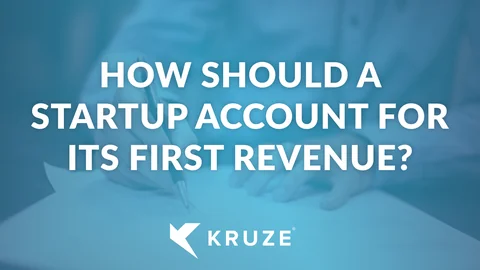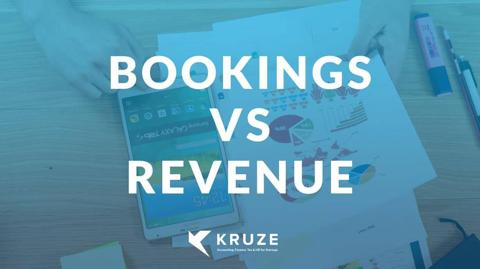
Collecting your first revenue is an amazing day in a startup. Someone is actually paying you money for something you built. It’s incredible. It’s like the ultimate validation, right? And once you get this first piece of revenue in, then you start thinking, “How do I get more revenue?” But let’s focus on the here-and-now of how a startup should account for its first revenue (and ongoing revenue).
Start with a contract – the basis of revenue accounting – an agreement between two parties
This will sound somewhat basic, but the first thing you’re going to want to do is sign a contract. You need to have some type of contract that states what you’re going to provide to your customer, such as terms of service and a statement of work. And this is important because you want to have some legal protections in there for both parties. And you really need to just spell out the deal. So a consumer internet company, for example, might embed the contract in the terms of service on your website, or inside the app.
And your contract process might be as simple as people clicking and using face ID to subscribe to your app inside of Apple. Or if you’re a SaaS company, you’re probably going to send them either a contract through EchoSign, DocuSign, or a similar service, or they click through on your website agreeing to this. For biotech companies, for example if you’re selling to a pharma company or you’re doing a partnership there, it’s probably going to be a much longer contractual process because there’s a lot of IP at stake. But the big thing is, you need to have the terms of engagement there.
The next step to recognizing revenue is invoicing
And then once you have the contract signed you need to invoice the customer. This is where things get exciting, and there’s also some block-and-tackling here. So a lot of people ask us, “What’s the best invoicing tool for customers?”
And I have a couple of favorites. Nothing here is world-beating or going to change your life, because it’s not a super complex process. I personally like QuickBooks Online invoicing because it’s already integrated into QuickBooks Online, your accounting system. And so then you can see all the open invoices, which immediately become accounts receivable. You can collect through QuickBooks as well, and mark the invoices paid. Stripe has invested a lot in their invoicing tools in the last year. They still have a little way to go, but I expect (I’m recording this in September of 2021) that in the next six months it will be a really strong tool. It’s perfectly fine right now. Another option is Bill.com, which we actually recommend a lot of times for especially high volume invoicing. And they just made an acquisition of another invoicing tool, so I expect their tool to get a lot better as well.
There are also a bunch of independent apps you can use to invoice. If you’re super old school, or super in a hurry, or haven’t set any of this stuff up, guess what? You can Google and find an invoice template as a PDF online and send that. Fill it out, send it out. The most important thing is your customer gets that and knows how long they have to pay, what the amount is, and what the services being rendered are. And once they have that, they’re on the clock and it’s time for them to pay you.
Accepting payments
Now, as you know, you can get paid through wire transfers. If you’re using Stripe, you’re probably going to get paid through Stripe, like an ACH or credit card. The same is true with QuickBooks and Bill.com.
You can even get a check in the mail. That’s really old school. If you’re getting a lot of checks, I recommend setting up a lockbox service with your bank, where you can actually just give that out to your clients. And the checks will go to the bank. They’ll scan it, deposit it, and make it a lot easier for you so you’re not running to the post office all the time. But in the modern world we live in, electronic payments are always easier. And all of those tools I recommended have really strong, robust electronic transaction capability. So use one of them.
Cash or accrual accounting?
The next decision you’re going to make about your startup revenue is cash or accrual accounting. Please, if you’re a startup and you’re going to be venture capital-backed, the type of accounting method you want to use is accrual. That will make things so much easier for your friendly accountant, CPA, or Kruze Consulting. It’s also going to make it a lot easier for you, and it’s going to make it easier for your investors. Particularly when they are getting pitched to your company and are trying to figure out, “Is this recurring revenue? What does the monthly recurring revenue and annual recurring revenue look like?” Because everything’s going to be accounted for properly in compliance with GAAP. If you do cash accounting (which wouldn’t be my preference, but some people just need to do that just to get going), you would book that whole deposit, all the cash you get, just as revenue. And your cash account will go up as well. But you can see the problem here, right?
If you are a SaaS company or a pharma company or med tech company, you’re probably doing annual deals or multi-year deals. Well, those revenues need to be spread out over the length of the service provided on a pro-rata basis. And that’s why I like accrual accounting better. Because if you sell a $1.2 million deal for 12 months, you’re going to have $100,000 of revenue every month. And so the sales account is going to show $100,000 every month. You are going to have deferred revenue, which is a liability on your balance sheet, and that gets recognized every month that you provide service. So in the simple example of that 12-month deal, 1/12 of it gets recognized as revenue right away, and then 11/12 sits in deferred revenue. Then the next month, when you provide the service again, you would recognize another 1/12 in the second month, $100,000. And you now have 10/12 (5/6 for you math geniuses out there) sitting in deferred revenue. So that’s how accrual revenue accounting works.
Understanding Revenue Recognition
Revenue recognition is a critical concept in accrual accounting that dictates the criteria for recording sales and non-operating income as revenue. When your startup first starts generating revenue, you, as a founder, need to understand what revenue recognition is and how to do it properly for your company.
It’s important to note that your revenue might not directly match the cash in your bank or your billing activities. For instance, when a customer pays in advance for services yet to be delivered, this payment is classified as a liability, known as deferred or unearned revenue. This liability is only transformed into recognized revenue after the service commitment to the customer is fulfilled. Deferred revenue happens a LOT for B2B SaaS companies.
Navigating SaaS Revenue Recognition Challenges
For SaaS companies, the revenue recognition process entails more complexity. Payments received in advance for services that are spread out over time mean that revenue recognition must align with the gradual fulfillment of the service agreement.
This section aims to clarify the principles of SaaS revenue recognition and the application of these principles across various SaaS revenue scenarios.
Essential Principles for SaaS Revenue Recognition
When a SaaS business enters into a contract for the provision of services or goods, it should align with ASC-606 and IFRS 15 to comply with generally accepted accounting principles (GAAP).
The following five-step process is crucial for SaaS revenue recognition:
- Contract Identification: Understand the contract terms.
- Performance Obligation Identification: Determine the obligations within the contract.
- Transaction Price Determination: Ascertain the price of the transaction.
- Transaction Price Allocation: Allocate the price across the contract’s obligations.
- Revenue Recognition: Recognize revenue as the obligations are fulfilled.
These standards ensure that revenue from customer payments is recognized in a manner that reflects the delivery of services as stipulated in the contract.
If a customer consistently receives the same service, revenue can be recognized evenly across the contract period. However, if the service level or product changes, the recognized revenue each month may need to be adjusted to reflect these changes.
Efficiently Managing SaaS and Subscription Revenue
Maintaining a revenue schedule helps in tracking the monthly recognized revenue from various contracts. This schedule is vital for adjusting forecasts to prevent overestimation or underestimation of future revenue.
For instance, if a customer cancels their subscription, the revenue schedule should be updated to cease revenue recognition from that contract. Conversely, if a customer upgrades their subscription, the schedule must reflect the increased transaction price and, subsequently, the higher monthly revenue recognition.
Accounts receivable and cash when accounting for revenue
There’s one other little thing on the accounting side. The moment you send that client the invoice after you have the contract and you’re starting to provide service, you can book that as revenue on accrual, and you typically are going to book accounts receivable, and accounts receivable is going to go up. Now, when you collect that cash, you’re not actually really going to touch anything on the sales side because that’s already been booked, but you are going to move your cash account up because your cash increased. And your accounts receivable is going to go down. And both cash and accounts receivable are on the asset side of the balance sheet.
So one goes up, one goes down. And that’s very common, especially with enterprise companies that are accounting for revenue. They’re almost always going to have an accounts receivable balance, which is perfectly fine and can be a valuable financing tool. When lenders are looking at your company, they’re going to look at your cash. And they’re going to look at your accounts receivable to determine kind of what your current assets are, like your liquidity. So in most cases, accounts receivable is almost as good as cash provided. It’s not like it has aged out. It’s not beyond 90 days or something like that, uncollected. This part of accounting, where the cash and other items on the balance sheet are going up and down, is called “working capital.” We’ve written pretty extensively about working capital – suffice to say, it really starts to impact your cash position and cash burn as revenue grows! So pay attention to it.
Accrual accounting makes your financials smoother
So remember, ideally you’ll choose accrual accounting for your revenue. That’s how all the best VC-backed startups do it. That’s how Kruze does it. It will make your life easier because your financials are not going to be super bumpy. But the most important thing is to get that contract signed, get the invoice out, and eventually collect the cash. And guess what? You’re on your way. And you can start thinking about how you’re going to sell your second customer and your third customer and so on. And someday you will be a huge success.
And you will remember these little accounting things you had to learn along the way. I hope that helps. Hit us up at kruzeconsulting.com if you have any questions. Thanks.















